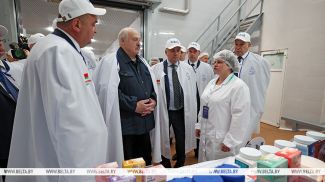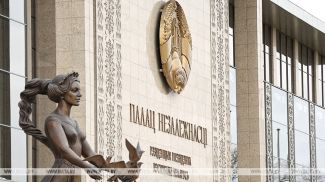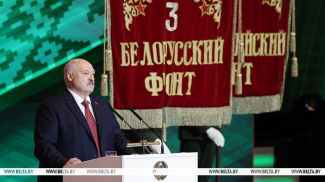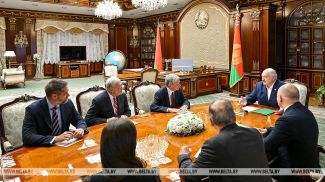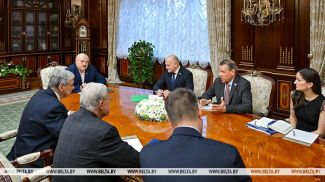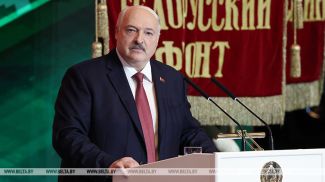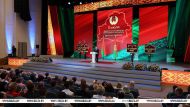MINSK, 25 January (BelTA) – There are a number of key conditions that have to be met for getting high academic titles and state awards. Belarus President Aleksandr Lukashenko made the relevant statement at a meeting with representatives of the National Academy of Sciences of Belarus on 25 January, BelTA has learned.
In his speech during the meeting Chairman of the Presidium of the National Academy of Sciences of Belarus Vladimir Gusakov pointed out that the new academicians and corresponding members of the academy, who had received their diplomas from the president earlier that day, had been awarded these titles after a rigorous selection process. “It is universally recognized that the strongest won – the scientists, who boast outstanding results in their fields of expertise. The elections proceeded in strict compliance with the law and with charter documents of the Academy of Sciences,” Vladimir Gusakov said.
Aleksandr Lukashenko said: “I know that not everyone sees the elections of the academicians and the corresponding members the same way. Some have been offended and what not. But you and I are adults already and I understand that in this process some people will always be satisfied and some will be dissatisfied, such is life. But you have to know my key requirement: everything should be honest and fair. If a person deserves it, he or she should be an academician, a corresponding member, a doctor of sciences, a professor. We should not devalue these notions. The general, the professor, the academician have become a people's brand.”
The president stressed it is not that easy to get the rank of, for instance, the general or to get a state award in Belarus, they have to be earned. “My demand is that the academician has to be a reliable person, he or she has to be dedicated to the state. If you are an academician, you have to work for the country's benefit. Otherwise, what kind of an academician are you?” the president said.
Aleksandr Lukashenko pointed out that he has been closely overseeing processes going on in the National Academy of Sciences of Belarus since the very first years of his presidency in order to safeguard scientists against all kinds of unnecessary influence and outside impacts.
In turn, Vladimir Gusakov drew attention to the great progress the academy had secured since the early 1990s when the state of affairs in the National Academy of Sciences of Belarus was deplorable. He said that many scientists, particularly young ones, quit back then. The academy suffered from the lack of funding, rapid depreciation and looting of the physical infrastructure, from the lack of prospects. “Many kept working without getting paid and only thanks to their enthusiasm. Some said the academy was doomed, that it would be shut down and the institutes would be attached to higher education institutions while the property would be sold off. Only the election of the president put an end to the total devastation of science.” The head of the young sovereign state visited the Academy of Sciences, met with the scientists, and problems started being gradually resolved. “Hope and confidence appeared. The scientists felt care and prospects,” Vladimir Gusakov pointed out.
He stressed: “We know that various bad ideas have been suggested to the president, too such as market-driven reforms, the conversion of the Academy of Sciences into a scientist club. It was suggested that the academy should be stripped of its status and should be deprived of the ability to carry out fundamental and applied research. But the head of state had enough courage and wisdom to reject all these destructive ideas and focus on forming our own strong diversified and well-developed national science.”
Speaking about the current state of science, the official pointed out that the academy hits the main performance targets, including the volumes of production, sales, and export. About 280-300 academic R&D products are assimilated into the Belarusian economy and the social sphere every year. Apart from that, goals of research programs have been upscaled recently, minor goals have been dropped, research scopes and the composition of research teams have been optimized, and the entire structure of the academy has undergone a systemic optimization.
“The key thing is that we've managed to adapt fundamental and applied science to needs of the economy, to concentrate financial assets and the scientific and manufacturing potential on accomplishing the most important tasks of the national economy. And now we don't see a difference between fundamental science and applied science – all the science works for the benefit of the country's economy,” he stated.
Speaking about prospects, Vladimir Gusakov noted it is necessary to more actively tap into the potential of strong scholarly traditions in order to accomplish economic tasks. It is necessary to accelerate the research process from the idea to the assimilation of the end product. It is necessary to improve the procurement system for scientific needs.
Having heard Vladimir Gusakov's speech, Aleksandr Lukashenko noted that Nikolai Borisevich, who ran the academy during the times of the Belarusian Soviet Socialist Republic, played a significant role in the establishment of the National Academy of Sciences of Belarus. Aleksandr Lukashenko said: “Back then I managed to find a person in the Academy of Sciences, who, roughly speaking, became a member of my team and supported me during the election.”
The head of state also recalled attempts of nationalists to convert the National Academy of Sciences of Belarus into a scientist club. “You know that I am no retrograde. The conversion may have been effective but did we have to do it back then? I understood that if we started dividing, recombining all of it and splitting it between universities and enterprises, we would lose everything soon. There were other things to take care of. This is why I decided that the Academy of Sciences should report to the president directly. I decided to protect the scientists. And then… If we manage it, well then. If we don't, those are your problems.”
“But you did well,” the Belarusian leader continued. “You've saved the Academy of Sciences. When you contacted me, I supported you and didn't allow anyone to interfere with your processes and loom over excessively. Our relations, relations between the president and the Academy of Sciences are unique.”
According to the president, back then many were concerned that the academy would not be independent. “But my goal was to secure your independence so that no one could come, stomp their foot and say: that person will be an academician while this one will be a corresponding member,” he noted. “We cannot allow such things. I strongly hope such things don't happen.”
Apart from that, the head of state reminded about his past decision to set up applied science centers, which are supposed to keep the National Academy of Sciences of Belarus closer to the real life. As an example the academy's agricultural enterprises were mentioned. They develop quite successfully now thanks to modern R&D products, which are assimilated right away.




